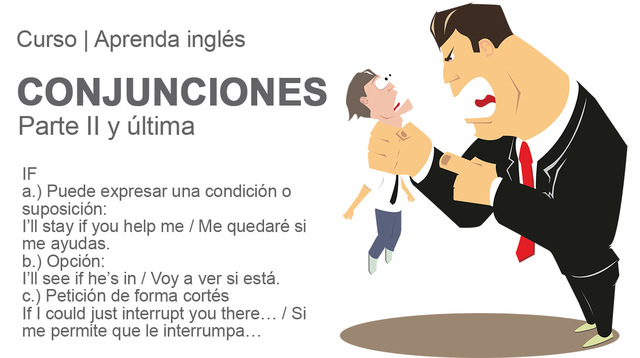
IF
a.) Puede expresar una condición o suposición:
I’ll stay if you help me / Me quedaré si me ayudas.
b.) Opción:
I’ll see if he’s in / Voy a ver si está.
c.) Petición de forma cortés
If I could just interrupt you there… / Si me permite que le interrumpa…
LEST
Para que no, por miedo a
I didn’t do it lest he should beat me / No lo hice por miedo a que me pegara
A veces se usa ’ lest’ detrás de los verbos ‘fear’, ’ be afraid’ ‘of’, etc en lugar de ’ that’
‘Lest’ es muy formal y no se utiliza habitualmente en el inglés corriente.
LIKE
Como
He acts like he owns the place / Se comporta como si fuera el dueño.
NOT ONLY… BUT ALSO
Se usa cuando se quiere dar mayor importancia al segundo de los hechos:
Not only I read English but also I write it / No sólo leo en inglés, sino que también lo escribo
OR
Puede tener tres significados muy distintos:
a.) Equivalente al ‘o’ español
There were 35 or 40 people there / Había 35 ó 40 personas
b.) o, si no
Hands up or I’ll shoot! / ¡Arriba las manos o disparo!
c.) ni
He can’t read or write / No sabe leer ni escribir.
WHILE
Tiene el significado de ‘mientras’, ‘aunque’.
She only saw him twice while he was staying there / Le vió solamente dos veces mientras él estaba allí
While I admit it is difficult, I don’t think it is impossible / Aunque reconozco que es difícil, no creo que sea imposible
Ejercicios
– Emplea la conjunción adecuada en las siguientes frases:
1. He was anxious__________ I should miss the bus.
2. She arrived_____________ you were leaving.
3. He has remained poor, ____________ her friends have made a fortune.
4. She told him not to stay,____________ to go to the theatre.
5. Fish is food for the brain _______________ good protein.
6. ___________he goes or I go.
7. It was ___________ when you were at school.
8. Her accent is good, _________ at least not bad.
9. __________ it rains we will stay at home.
10. She avoided him, ___________ he was rude.
Soluciones: 1. in case 2. as
3. while 4. but 5. as well as 6. either
7. like 8. or 9. if 10. because